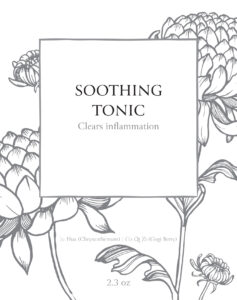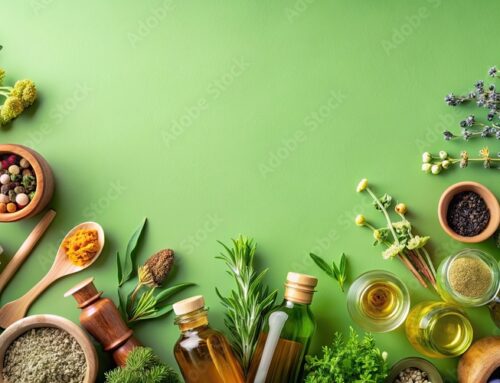Chrysanthemum, known as “ju hua” (菊花) in Chinese, holds a special place in East Asian medicine and culture.  It is also the chief herb in our Soothing Tonic tea. This bright, delicate flower, revered for centuries, is more than just a symbol of autumn and resilience. Chrysanthemum tea and herbal preparations have long been valued for their health benefits, particularly for promoting longevity and enhancing overall well-being.
It is also the chief herb in our Soothing Tonic tea. This bright, delicate flower, revered for centuries, is more than just a symbol of autumn and resilience. Chrysanthemum tea and herbal preparations have long been valued for their health benefits, particularly for promoting longevity and enhancing overall well-being.
Historical and Cultural Significance
Chrysanthemum has been used in East Asian traditional medicine, especially in China, for over two millennia. In Chinese culture, it symbolizes vitality, renewal, and longevity. It’s one of the “Four Gentlemen” in Chinese painting, representing the virtues of integrity and perseverance, qualities linked to long life.
Medicinally, Chrysanthemum is a major component in East Asian Medicine. It is considered a cooling herb and is often used to help balance excess heat in the body. This association with cooling extends to the flower’s ability to soothe and prolong health in various ways.
Key Health Benefits
- Rich in Antioxidants: Chrysanthemum flowers contain a variety of antioxidants, such as flavonoids and phenolic acids. Antioxidants are known to neutralize free radicals, the unstable molecules that cause cell damage and aging. By reducing oxidative stress, Chrysanthemum helps protect the body from premature aging and degenerative diseases.
- Supports Eye Health: One of the traditional uses of Chrysanthemum in Chinese medicine is to treat eye-related issues. It’s believed to help relieve eye strain, redness, and irritation, making it an essential remedy for those who spend long hours in front of screens. The longevity of vision health is vital for overall well-being, and Chrysanthemum plays a preventive role in preserving eyesight into old age.
- Lowers Blood Pressure and Improves Heart Health: Regular consumption of Chrysanthemum tea is believed to help lower blood pressure, reduce cholesterol levels, and improve circulation. Since heart disease and hypertension are significant concerns for aging populations, Chrysanthemum’s cardiovascular benefits make it an excellent herb for promoting longevity. Studies have suggested that the flower’s compounds improve blood vessel function and help protect against arterial plaque buildup.
- Anti-inflammatory and Immune-Boosting Properties: Chrysanthemum is known for its anti-inflammatory properties, which play a critical role in slowing down the aging process. Chronic inflammation is a major contributor to diseases like arthritis, heart disease, and neurodegenerative conditions. Regular consumption of Chrysanthemum helps reduce inflammation and supports the immune system, making it a staple for enhancing overall vitality and life expectancy.
- Promotes Calm and Stress Relief: In TCM, stress and anxiety are considered contributing factors to premature aging. Chrysanthemum has calming properties that can help reduce stress and promote relaxation. By calming the nervous system, Chrysanthemum tea is not only a soothing drink but also a way to support mental longevity, clarity, and emotional well-being.
- Detoxifies the Body: Chrysanthemum is often used in East Asian medicine for detoxification, helping to clear heat and toxins from the liver. As the liver plays a crucial role in cleansing the blood and maintaining overall health, keeping it in optimal condition is essential for longevity. A healthy liver leads to clearer skin, better digestion, and an overall sense of vitality.
Chrysanthemum in Daily Life
In East Asia, Chrysanthemum is consumed primarily in the form of tea, often brewed with dried flowers. It has a mild, slightly sweet flavor, making it a soothing, aromatic beverage that is as pleasant to drink as it is beneficial for health. Chrysanthemum can also be used in tinctures, poultices, and combined with other herbs to enhance its effects.
In addition to medicinal uses, Chrysanthemum is commonly incorporated into meals. Chrysanthemum greens, or edible varieties of the plant, are added to soups, salads, and stir-fries for a nutrient boost.
Conclusion: An Age-Old Secret for Longevity
Chrysanthemum’s use in East Asian medicine for promoting longevity is deeply rooted in tradition, supported by modern research, and continues to be relevant in today’s health-conscious world. Its combination of antioxidants, anti-inflammatory properties, cardiovascular benefits, and calming effects makes it a natural ally for those seeking to maintain their health and vitality well into old age. By embracing the wisdom of Chrysanthemum, we can incorporate a simple yet powerful remedy into our daily lives that honors both the body and the mind on the journey toward longevity.
So, whether you’re sipping on a warm cup of Chrysanthemum tea or including it in your daily health regimen, you’re partaking in an ancient practice with timeless benefits.





Leave A Comment
You must be logged in to post a comment.